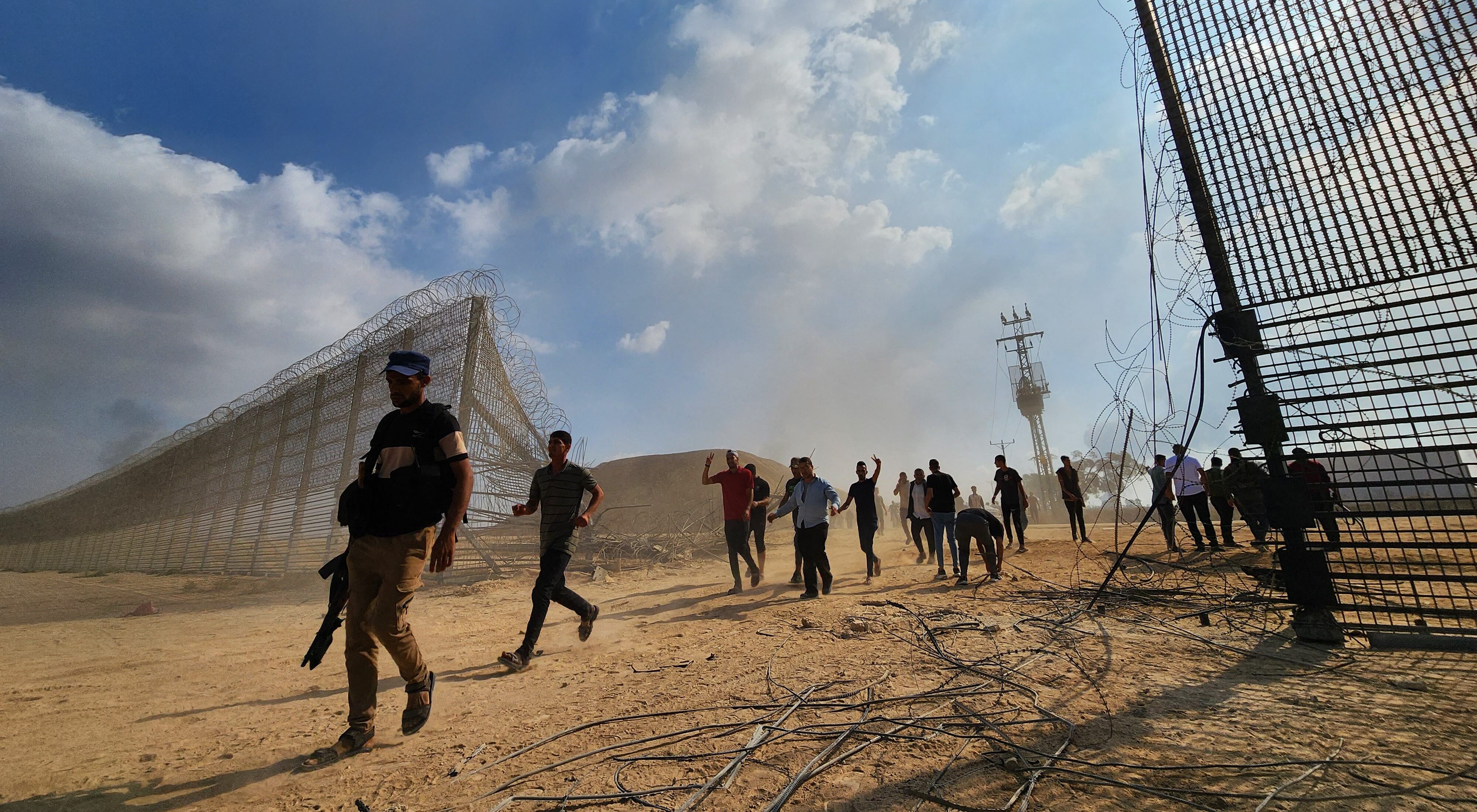In the early morning hours of October 7, scores of Hamas fighters launched a dramatic and unprecedented land, air, and sea attack on Israel.
Coming a day after the 50th anniversary of Egypt and Syria’s 1973 surprise attack on Israel, the Hamas operation likewise caught the Israeli military and intelligence apparatus completely off-guard, with fighters able to penetrate the Israeli barrier erected around Gaza and raid Israeli towns, military bases, and the southern city of Sderot, near the border. Dozens of Israelis were reportedly taken prisoner, while at least 100 were killed and several hundred wounded according to the Israeli Ministry of Health, as thousands of rockets fired from Gaza destroyed Israeli infrastructure. Israel responded with airstrikes on Gaza that have already killed hundreds of Palestinians, with the number expected to rise.
The tactical success of an operation carried out by a militant group against one of the most powerful armies in the world has shocked many and reverberated widely. Undoubtedly, the ramifications of it will be felt both in terms of life, as Israel predictably retaliates with immense force in the coming days, but also for the multiple parties and processes this event touches and the illusions it shatters.
The astonishing, multifaceted attack must have taken months of planning by Hamas and anyone else involved, with extreme discipline in terms of secrecy given Israel’s extensive intelligence network in the Palestinian territories. As such, it no doubt represents a massive intelligence failure for Israel that will shake the foundations of the country’s security establishment. Part of this can be attributed to the fact that Israel has been facing nearly ten months of intensive political crisis, as the current government’s judicial reform initiative provoked an extensive and sustained protest movement that has gripped the entire country. This has absorbed considerable attention from all facets of Israeli society, including the military, with many reservists refusing to serve despite warnings it would impact Israel’s security readiness.
More salient, however, is the enduring situation of oppression and despair on the Palestinian side. Israel has stamped out even the dimmest hope of ending its half-century occupation through diplomatic means. Successive Israeli governments have not only ditched the pretense of negotiating over a Palestinian state but have openly declared their intention to rule over Palestinians indefinitely, while denying them their basic rights and freedoms. That is not only the case in Gaza, in which more than 2 million people have lived under siege for 16 years in what is regarded as the world’s largest open-air prison, but also in the West Bank where another 3 million Palestinians are penned in 167 ghettoized enclaves in a crystalizing regime of apartheid. As the deteriorating situation has made people increasingly desperate, Israel has responded with little beyond force, ramping up violence against Palestinians to a level not seen since the Second Intifada two decades ago.
Moreover, Jewish fundamentalist settlers have been running rampant in the West Bank, seizing land and attacking vulnerable Palestinian villages and villagers. East Jerusalem has been severed from the rest of the occupied territories, its Palestinian residents steadily pushed from their homes through an explicit program of “Judaization,” while Jewish fundamentalists have set their sights on the Palestinian’s most important holy places. Indeed, Hamas said the latest operation was a response to provocations at the Al-Aqsa Mosque compound, which has been the location of intensifying provocation over the past few years, including two days ago when 800 Jewish settlers stormed the compound under the protection of Israeli forces.
In short, there is nothing on the horizon but more suffering and loss. In spite of this, the international community has taken no action. And although violent flare-ups from Gaza have become recurrent events that momentarily capture international attention, the West has done nothing but endorse the occupying army’s “right to defend itself” against the people it occupies.
It is not surprising that this time around the United States and European Union fell into their predictable patterns, endorsing Israel and condemning Hamas, without mentioning the unlivable situation in Gaza, the endless siege, or the lack of basic rights. No thought was given to the double-standard when compared to Western support for Ukraine against Russia’s invasion and occupation. Nor was any mention of made to the underlying political question of Palestinian self-determination, which runs to the heart of this issue.
It is quite possible that Hamas’s leadership is hoping the spectacular scale of this operation—or war, as Israeli Prime Minister Benjamin Netanyahu has called it—will act as a wakeup call and be enough to break the interminable status quo. Although the future is difficult to predict beyond the overwhelming likelihood that Israel falls back on its own playbook of unthinking military response, perhaps even initiating a ground invasion of the Gaza Strip, there is little doubt that this event will leave no one and nothing untouched.
The current Israeli government will surely come under fire for not only failing to anticipate the Hamas attack but by polarizing the country and bringing it to a standstill through its policy initiatives. It would not be surprising if the ultimate price it pays is collapse, although its constituent parties appear committed to staying in power at all costs. The fact that Hamas has taken so many prisoners likely means this will continue to play out in Israeli politics well beyond an assault on Gaza.
The ongoing protest movement will also likely be affected, as Israelis will be prompted to stop their infighting—at least temporarily—and come together in defense of the nation. At the same time, Israeli militant settlers may carry out their attacks with greater fervor and even less military restraint against the vulnerable Palestinian civilian population in their vicinities, who have virtually no protections or security. This could easily cause the current crisis to spread to the rest of the country, much like April-May 2021, drawing in Palestinian citizens of Israel and provoking full-scale unrest.
In terms of internal Palestinian politics and the balance of power, the Hamas initiative will further isolate the Fatah-dominated Palestinian Authority, which is already facing a crisis of legitimacy and rock-bottom support. Palestinians increasingly view the PA as an arm of the Israeli regime, policing Palestinian resistance while doing nothing to safeguard civilians against Israeli attacks. While Hamas’s popularity usually benefits from its willingness to resist Israel, the nature of this action—the likes of which have not been seen on the Palestinian side since the heyday of its revolution in the 1960-1970s, if ever—this operation will no doubt boost Hamas’s standing in the immediate term, particularly as Palestinian public opinion has shifted toward the armed resistance camp. According to the most recent polling, a slim majority of Palestinians in the occupied territories support a return to armed intifada and confrontation, including 64% in Gaza and 47% in the West Bank. If a wider unrest is imminent, then the current political order, along with the PA, could be at its end.
Beyond Palestine-Israel, the ensuing war could have an impact on negotiations between Saudi Arabia and Israel regarding the normalization of their relations. The Saudi Foreign Ministry released a statement calling for “an immediate halt to the escalation between the two sides,” while blaming it on the “continued occupation, the deprivation of the Palestinian people of their legitimate rights, and the repetition of systematic provocations against its sanctities.” Yet at a time when a Palestinian militant group is able to pull off something not seen from an Arab state since the 1970s, and which has captured the attention of the whole world, Riyadh will have to decide if it feels comfortable moving in the opposite direction, embracing an Israeli government that is openly pursuing the dissolution of the Palestinian question and the consolidation of an apartheid regime. It will likely stand as a reminder to the Saudis that the Palestinian problem is not going anywhere, that it will continue to deteriorate, and that they normalize relations with Israel at their own peril.
More than anything else, however, the Hamas assault is a challenge to the prevailing belief in Israel and elsewhere that the Palestinian people can be boxed into an intolerable situation forever and be ignored. For some time, the only discernible strategy in Israeli politics—whether or not it’s shared by all—has been to pursue the colonization and annexation of Palestine while undercutting Palestinian political aspirations. The straight-jacket of firmly-rightwing politics leaves Israel’s security establishment with nothing to do but implement a policy of containment against Palestinian resistance without any expectation that the political establishment will resolve the underlying problems. But imprisoning a people indefinitely behind walls and checkpoints does nothing to address their needs while only aggravating their grievances. This can only lead to chronic instability and violence that will manifest in new and unforeseen ways.
The Hamas operation is but the latest example of this, and one that will no doubt come with far-reaching consequences. But that, one imagines, is the point.
The opinions expressed in this article are those of the author and do not necessarily reflect the views of the Middle East Council on Global Affairs.

